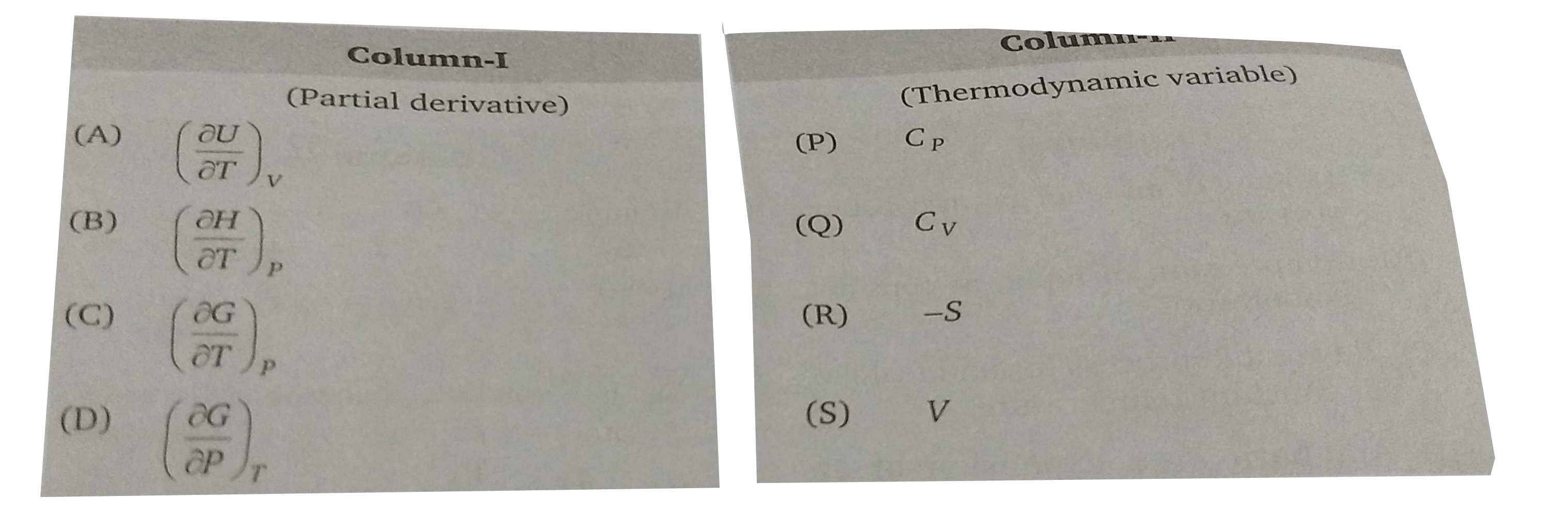ΔS for freezing of 10 g of H2O(l) (enthalpy of fusion is 80 cal/g) at 0∘C and 1 atm is : Solution in Punjabi
12.25J/K
−0.244J/K
−2.93J/K
−12.25J/K
The correct Answer is:D
ΔSfreezing =−ΔHfusionT
⇒ ΔS=−80×10273×4.18
=−12.25J/K
Topper's Solved these Questions
- THERMODYNAMICSBook:NARENDRA AWASTHIChapter:THERMODYNAMICSExercise:Level 3 - One Or More Answers Are Correct
Explore 1 Video
- THERMODYNAMICSBook:NARENDRA AWASTHIChapter:THERMODYNAMICSExercise:Level 3 - Match The Column
Explore 2 Videos
- THERMODYNAMICSBook:NARENDRA AWASTHIChapter:THERMODYNAMICSExercise:Level 2 (Q.1 To Q.30)
Explore 1 Video
- STOICHIOMETRYBook:NARENDRA AWASTHIChapter:STOICHIOMETRYExercise:Level 3 - Subjective Problems
Explore 20 Videos
Similar Questions
Assume ideal gas behaviour for all the gases considered and neglect vibrational degrees of freedom. Separate equimolar sample. Separate equimolar samples of Ne, O2 , CO2 and SO2 were subjected to a two process as mentioned. Initially all are at same state of temperature and pressue.
Step I → All undergo reversible adiabatic expansion to attain same final volume, which is double the original volume thereby causing the decreases in their temperature.
Step → After step I all are given appropriate amount of heat isochorically to restore the original temperature.
Mark the correct option(s) :
View SolutionMatch the following columns

View SolutionWrite structure of 2,2-dimethylheptane.
View SolutionWhat volume of a liquid (in L) will contain 10 mole ? If molar mass of liquid is 280 and its density is 1.4 g/mL.
View Solution100 g of water is supercooled to - 10∘C. At this point, due to same disturbance mechanised or otherwise some of it suddenly freezes to ice. What will be the temperautre of the resultant mixture and how much mass would freeze ?[sw=1cal/g/.∘CandLwFusion=80cal/g]
View SolutionCalculate the change in enthalpy , DeltaH , for the combustion of 11.2 L of hydrogen gas , measured at 0^(@)C and 1 atm pressure , to orm H_(@)O(g) : {:(DeltaH_(f)^(@),(KJ.mol^(-1))),(H_(2)O(g),-241.8):}
View Solution120 g of ice at 0^(@)C is mixed with 100 g of water at 80^(@)C . Latent heat of fusion is 80 cal/g and specific heat of water is 1 cal/ g-.^(@)C . The final temperature of the mixture is
View Solution10 g of ice at 0^(@)C is mixed with m mass of water at 50^(@)C . What is minimum value of m so that ice melts completely. (L = 80 cal/g and s = 1 cal/ g-.^(@)C )
View SolutionThe enthalpy change when 1.00 g of water freezes at 0^(@)C and 1.00 atm is (DeltaH_("fusion")=1.435 k.cal//mol)
View SolutionDeltaS for freezing of 10 g of H_(2)O(l) (enthalpy of fusion is 80 cal/g) at 0^(@)C and 1 atm is :
View Solution5 mole H_(2)O(l) at 373 K and 1 atm is converted into H_(2)O(g) at 373 K and 5 atm . DeltaG for this process is [Given: R = 2 cal/K-mol]
View SolutionIf boiling point of an aqueous solution is 100.1∘C. What is its freezing point? Given latent heat of fusion and vaporization of water are 80calg−1 and 540calg−1 respectively.
View SolutionH2(g)+12O2(g)→H2O(l),ΔH at 298K=−285.8kJ
The molar enthalpy of vapourization of water at 1 atm and 25∘C is 44 kJ. The standard enthalpy of formation of 1 mole of water vapour at is
View Solution50 g of ice at 0^@C is mixed with 50 g of water at 80^@C . The final temperature of the mixture is (latent heat of fusion of ice =80 cal //g , s_(w) = 1 cal //g ^@C)
View SolutionHow much heat is required to change 10g ice at 0∘C to steam at 100∘C? Latent heat of fusion and vaporisation for H2O are 80clg−1 and 540calg−1, respectively. Specific heat of water is 1calg−1.
View Solution100 g of water is supercooled to - 10^@C. At this point, due to same disturbance mechanised or otherwise some of it suddenly freezes to ice. What will be the temperautre of the resultant mixture and how much mass would freeze ? [s_w = 1 cal//g// .^@ C and L_(Fusion)^(w) = 80 cal//g]
View Solution